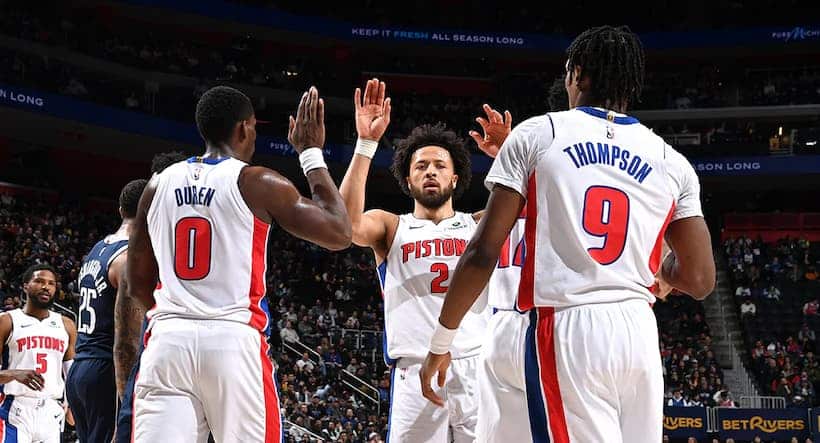Either Malcolm Brogdon or Immanuel Quickley would make a fine choice for Sixth Man of the Year.
But Malcolm Brogdon should win.
Before I address their candidacies, I want to dismiss one argument at the start. IQ has started nineteen games, and his stats in those games significantly boost his season averages. He’s averaging 22.6 points, 5.4 rebounds, and 5.1 assists in starts, markedly higher than his season average in all categories.
I’ll be blunt, I don’t care. Part of a sixth man’s job is filling in as a starter when he’s asked to. IQ thriving as a starter is more of a knock on Tom Thibodeau’s insistence on playing RJ Barrett big minutes than it is on IQ’s sixth man argument. Here’s the important part, even if you include Quickley’s stats as a starter, Malcolm Brogdon still deserves the award over him.
First, we’ll look at the traditional stats and some of our more mundane advanced metrics (assist percentage, true shooting percentage, etc.). Then we head off to the land of all-in-one impact metrics.
Traditional Metrics
Malcolm Brogdon – 26 mins, 14.9 pts, 4.2 rebs, 3.7 asts, 1.5 tovs, 48.4/44.4/87 shooting splits
Immanuel Quickely – 28.9 mins, 14.9 pts, 4.2 rebs, 3.2 asts, 1.2 tovs, 44.8/37.0/81.9
On first blush, there is absolutely no argument for Immanuel Quickley over Malcolm Brogdon. Brogdon equals IQ in points and rebounds despite playing fewer minutes, averages more assists, and dwarfs him in shooting efficiency. If we look at some of the less traditional offensive numbers, Brogdon’s gap widens. Quickley’s 53.7% Effective Field Goal Percentage and 57.8% True Shooting percentage are both 3.7% lower than Brogdon’s. For reference, Brogdon’s efficiency is roughly equivalent to Donovan Mitchell, while Quickley’s is in the Patrick Williams range.
On the playmaking front, not a particular strength of Brogdon’s game albeit not a weakness either, he has a pretty clear edge. Averaging a half of an assist more in three less minutes and a higher percentage of his possessions end in assists. Brogdon’s aggressive style of repeated straight-line drives wears defenses down and opens up passing lanes for easy kick outs. He drives 11.3 times per game to Quickley’s 8.9 (still a very solid number, especially for a smaller guard), and assists on 11.9% of those drives to Quickley’s 9.8%. It’s worth noting, when Quickley does drive to score, he is more efficient. He also turns it over less and has a better assist to turnover ratio (2.79 to Brogdon’s 2.53). Quickley is far from a bad offensive player, but Brogdon has simply had a significantly better offensive season than IQ.
I will touch on defensive stats briefly because the next section will focus on that in more depth, and I’m not sure these traditional stats really illustrate how much better Quickley is defensively (it’s a lot). Quickley averages 1 steal a game to Brogdon’s 0.7. Opponent field goal percentage is 1.9% worse on shots IQ contests, while Brogdon has the magical ability to make opponents shoot better than their average, 1.3% better to be precise. Just as there’s no argument for IQ over Brogdon on the offensive side of the ball, the inverse is true defensively in the traditional metrics.
Photo by Maddie Meyer/Getty Images
Advanced Metrics
If you are inclined to argue on Quickley’s behalf, this is where you would start. He has a significant lead on Brogdon in just about every all-in-one impact metric that is publicly available, many of them significant. He leads in 538’s RAPTOR 3.4 to 1.8, ESPN’s RPM 1.25 to -2.77, BBall Index’s LEBRON 2.03 to .50.
Considering Brogdon’s sizeable gap on the offensive side of the ball, it’s clear that Quickley’s flying past Brogdon in these metrics mainly due to defense (although there’s some weirdness in RAPTOR that rates Brogdon as a negative offensive player and a positive defensive player, which I have difficulty rationalizing). Here’s the thing, I fully believe Quickley is a better defensive player, but I think there’s some noise in the data that’s overstating his impact. Allow me to explain.
Brogdon and Quickley share a somewhat similar net rating (using pbp stats), 4.65 and 6.46 respectively. A nice edge to Quickley certainly, but both in the realm of productive helpful player. Both the Celtics’ offensive and defensive ratings get worse when Brogdon comes on. About 2.9 points per 100 on offense and about .9 on defense. This shouldn’t be shocking — he regularly enters the game for Jayson Tatum who supercharges the Cs on both ends.
Now let’s turn to Quickley. When he enters the game, the Knicks offense falls by 3.6 points per 100 possessions, whereas the defense goes berserk. With IQ on, the Knicks defense gets 12.2 points per 100 better. That is absolutely, mind numbingly insane. For reference, the Celtics’ defense gets about 4.7 points per 100 better when Rob Williams plays. That’s a similar number to the odds-on favorite for Defensive Player of the Year, Jaren Jackson Jr., who improves the Grizzlies’ defense about 4.8 points per 100 when he’s on the court.
Forgive me if I think there’s some noise in that number for Immanuel Quickley, unless you think he’s legitimately having one of the greatest defensive seasons ever. I just don’t buy that a point guard can possibly improve a defense by that much. It’s essentially unprecedented. Part of the reason? Quickley often enters the game when RJ Barrett leaves, and Barrett has been one of the most damaging high minute players in the league, if not the most damaging. Here’s an incredible thread on the RJ phenomenon.
1/ My final RJ Barrett thread this season:
I’ll cover:
How RJ compares to his fellow Knicks
How RJ compares to the league
How the Knicks played with RJ off the court
How the Knicks played in games RJ missedTLDR: RJ is the only thing holding the Knicks back from contention
— NBA Stats (@sports_mediocre) April 9, 2023
If we look at RJ’s on/off numbers, the Knicks defense gets 9.2 points per 100 possessions when he’s not on the floor, regardless of who replaces him. Part of why Quickley grades out so well in these impact metrics absolutely is because he is a very, very good player on both sides of the ball. Another part is that he’s simply not RJ Barrett.
I understand that all of these advanced impact metrics attempt to regulate on/off metrics and solve for the teammate problem, or in this case, the RJ Barrett problem. But they are far from perfect. Just give a quick glance and you will see some strange names in the top-20 players. I’m sorry Bulls fans, I just don’t think Alex Caruso is the 11th best player in the league, even if RAPTOR says so.
Quickley’s impact is real, but the numbers are so outrageous, they are almost certainly skewed in his favor just by virtue of who he replaces. Brogdon obviously suffers from the opposite phenomenon since Tatum has long been an on/off, net rating, and impact metric darling. This year is no exception.
Which brings us back to Brogdon and the Sixth Man of the Year Award. Like I said at the top, either guy is a deserving winner, it’s just that the numbers you’re forced to rely on to argue in IQ’s favor suffer from an intangibility not present in Brogdon’s case.
And yet, I can’t help but be drawn to Brogdon’s candidacy for a different set of intangible reasons. The last time Malcolm Brogdon started fewer games than he came off the bench was his second season in Milwaukee where he started 20 games and came on as a sub in 28. From that point on, Malcolm Brogdon has been a nailed on, borderline All-Star starter in the NBA. Noah Vonleh has started more games for the Celtics this year. Even still, Brogdon chose to come to Boston, despite being in his prime and knowing he was unlikely to start. Brogdon said it better than I could in a recent interview:
“Coming off the bench, it can be a challenge at times, to be honest. Having a career where you start your whole career and then you come off the bench, there are nights where you gotta suck it up,” Brogdon said.
“You’re not going to score as much or play as much, but I think that’s what makes a great team, having guys that are able to do that, having guys that are able to sacrifice.”
Like an avid golfer who becomes a dad and realizes his Saturdays are about to look a lot different, Malcolm Brogdon entered his 30s ready to sacrifice. To a casual observer, it almost certainly looks like the right decision, and it probably is, but that doesn’t make it any easier. So for that reason, give me Malcolm Brogdon.






